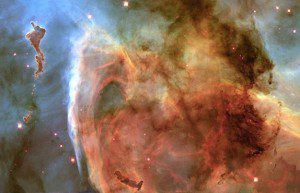 Most discussions of the Christian view of creation get off on the wrong foot right at the start. The problem is, they focus on the origin of the universe or the origin of life, not on the originator of life. From a Christian point of view this has to begin with Christ – in whom, by whom, and for whom everything was created. Anyone who has read my posts on Ron Highfield’s new book The Faithful Creator: Affirming Creation and Providence in an Age of Anxiety will know that I have some disagreement with some of his positions, but not in these next two chapters: Jesus Christ as Creator and Creation from Nothing. He makes a number of important points for consideration.
Most discussions of the Christian view of creation get off on the wrong foot right at the start. The problem is, they focus on the origin of the universe or the origin of life, not on the originator of life. From a Christian point of view this has to begin with Christ – in whom, by whom, and for whom everything was created. Anyone who has read my posts on Ron Highfield’s new book The Faithful Creator: Affirming Creation and Providence in an Age of Anxiety will know that I have some disagreement with some of his positions, but not in these next two chapters: Jesus Christ as Creator and Creation from Nothing. He makes a number of important points for consideration.
The key passages of Scripture connecting Christ and Creation are in Colossians 1, John 1, Hebrews 1, and 1 Cor. 8.
The Son is the image of the invisible God, … For in him all things were created… all things have been created through him and for him. (Col. 1)
In the beginning was the Word, … Through him all things were made; without him nothing was made that has been made. (John 1)
Yet for us there is but one God, the Father, from whom all things came and for whom we live; and there is but one Lord, Jesus Christ, through whom all things came and through whom we live. (1 Cor. 8)
In these last days he has spoken to us by his Son, whom he appointed heir of all things, and through whom also he made the universe. (Heb 1)
This connection between Christ and creation is of fundamental importance. Through the Trinity we see God revealed in a fashion that undermines the lifeless philosopher’s God.
The God who sent his Son to become flesh and blood among us to die and rise again through the Spirit for us sinners cannot be spaceless, timeless and loveless in his eternal life. Since what we know of God derives from how God has been revealed in Jesus Christ, we need not think of the triune relations as characterless causal relations. Those relations are acts of self-giving love. The Father’s fatherhood is his giving love for the Son in the Spirit and the Son’s sonship is his returning love for the Father in the Spirit. The Spirit is the bond of love between the Father and Son. The Trinity is an eternal community where cation, presence, life, causality, simultaneity (and hence time) fruitfulness, love, and otherness make sense. Hence in the eternal life of the triune God lies the possibility of creation. Since God is his own space and time and action and otherness, God can make room and time for creatures. (p. 127)
I might quibble on Highfield’s view of simultaneity and time, but this is minor in the present context. The Trinity defines a relationship within God himself not requiring any thing external to God. More significantly, however, the Trinity and the connection of Christ with creation puts to rest any notion of the incarnation as some kind of plan B in God’s creation.
We think of the incarnation as the result of a divine decision in time in response to the sin of humanity. Following the same trajectory it would seem that God’s decision to create and his decision to send his Son to become a creature are two separate decisions made for different reasons. Furthermore, given this line of reasoning, there would be no grounds for the incarnation had humanity not fallen into sin. God’s eternal plan, “the mystery of his will … to bring unity to all things in heaven and on earth under Christ” (Eph 1:9-10), would be relegated to plan-B status. But if we view salvation as the perfection and completion of creation, we will come to a different conclusion. We will then be able to reason backwards to creation from incarnation, death and resurrection, the end of which is to “bring unity to all things in heaven and on earth under Christ.” The decision to unite all things to God in Christ entails the decision to become incarnate, die and rise, and the decision to become incarnate entails the decision to create. (p. 128)
The point Highfield makes here is dead on. This is why I find the typical view of the biblical story as creation, fall, redemption, consummation to be missing an important element. Certainly we are fallen, and Christ is our redeemer, but there is so much more. Christ was from the very beginning was the perfection and completion of creation. The incarnation (including death and resurrection) is not, in any sense, plan-B; a response to humans (or worse some external malevolent being or force) knocking things off-kilter.
Highfield goes on:
What can we learn about God’s act of creating from the divine act of salvation? The Gospel of John may give us a clue. In Jesus’ final prayer for his disciples he said “Father, I want those you have given me to be with me where I am, and to see my glory, the glory you have given me because you loved me before the creation of the world.” (John 17:24) Why, then, did God create the world? Because Jesus loved us and wanted us to be with him forever. … How did God create the world? God created the world the same way he does everything else. The Father loves his Son, and the Son loves us in his love for the Father. Just as in his cat of salvation the Son’s love “compels us to love him in return, in creation it “compels” us to be (2 Cor. 5:14-15). (p. 129-130)
This isn’t an analogous to human creative activity, and it isn’t a material mechanism for creation. But we really shouldn’t look for a material mechanism. God creates from nothing – which takes us to the next chapter.
 Creation from nothing (ex nihilo) is a biblical doctrine in that it is consistent with the biblical understanding of God as free and sovereign, but it is not clearly in view in the Old Testament. The ancient authors were not thinking about the philosophical ramifications of creation from something versus creation from nothing. There was, however, a firm view of God as the one in whom and through whom creation came into being. Genesis 1 and Job make this clear. God spoke and things happened. But neither of these texts, or any others, deal with a mechanism for creation, or even with the origin of matter. Highfield argues that the articulated doctrine of creation from nothing arose primarily in response to Greek thought concerning world-formation. Much of the early and continuing speculation about creation from nothing wanders off on rabbit trails without leading anywhere productive. Creation from nothing is beyond our comprehension.
Creation from nothing (ex nihilo) is a biblical doctrine in that it is consistent with the biblical understanding of God as free and sovereign, but it is not clearly in view in the Old Testament. The ancient authors were not thinking about the philosophical ramifications of creation from something versus creation from nothing. There was, however, a firm view of God as the one in whom and through whom creation came into being. Genesis 1 and Job make this clear. God spoke and things happened. But neither of these texts, or any others, deal with a mechanism for creation, or even with the origin of matter. Highfield argues that the articulated doctrine of creation from nothing arose primarily in response to Greek thought concerning world-formation. Much of the early and continuing speculation about creation from nothing wanders off on rabbit trails without leading anywhere productive. Creation from nothing is beyond our comprehension.
The doctrine of creation asserts that God created the world we experience – the world of concrete objects, of ideas and sense experience, of minds and intelligibility and unintelligibility – through himself without help from any other power. It makes no difference to the doctrine of creation how concrete objects may be resolved into their constituents. The doctrine of creatio ex nihilo makes clear that the God-creature relation is unlike any creature-creature relation. Reason can hope to discover physical relationships – spatiotemporal, quantitative and causal – among creatures, and it may speculate about metaphysical constituents and relations within the world. … But reason, metaphysical or scientific, cannot cross the gap expressed in the term creatio ex nihilo. For God’s act of creating is a free act of the divine will, reasonable and beneficent for sure, but nevertheless not necessary. (p. 141-142)
Highfield wouldn’t go here – but I’d say that perhaps creation was necessary. But if so, it was only necessary for a reason internal to the very nature of God (perhaps relating to the relationship of love and creation Highfield touched on earlier). Using human reason we cannot get to a necessary creation any more than we can get to the very nature of God. All we have is the knowledge after the fact that God did create as an act of divine will.
This lays the groundwork for discussion of divine creation and modern science. The next chapter and the next post on Highfield’s book.
Is salvation a response to a problem or the perfection and completion of creation intended from the beginning?
What does it mean to affirm the New Testament view of Christ as the one through whom and form whom all was created?
If you wish to contact me directly you may do so at rjs4mail[at]att.net.
If interested you can subscribe to a full text feed of my posts at Musings on Science and Theology.















